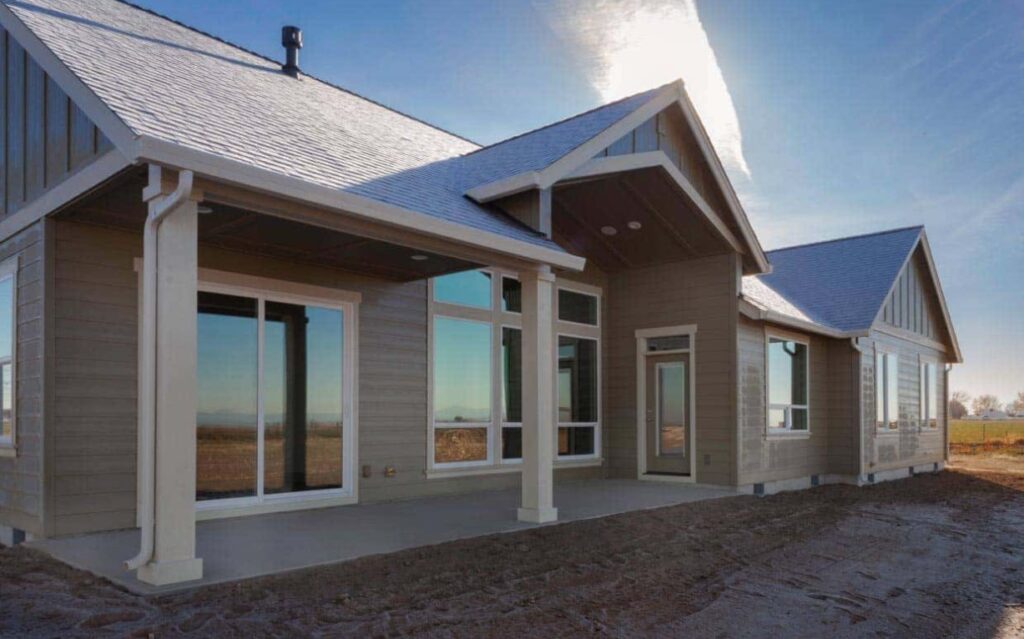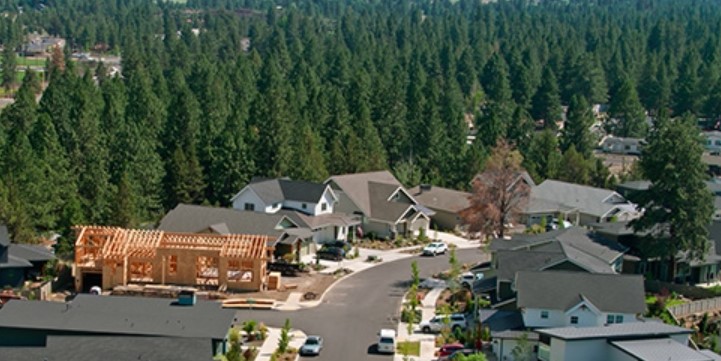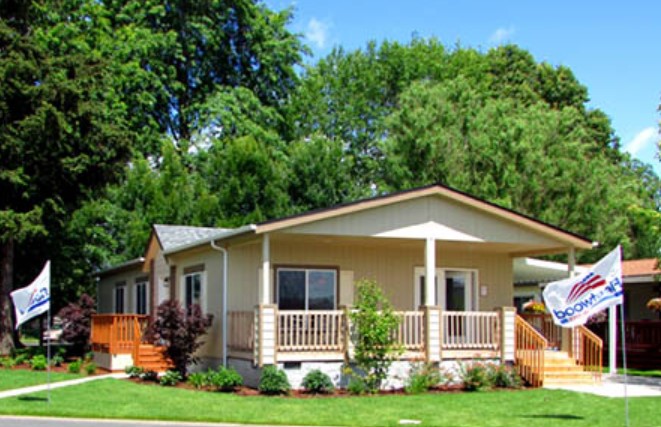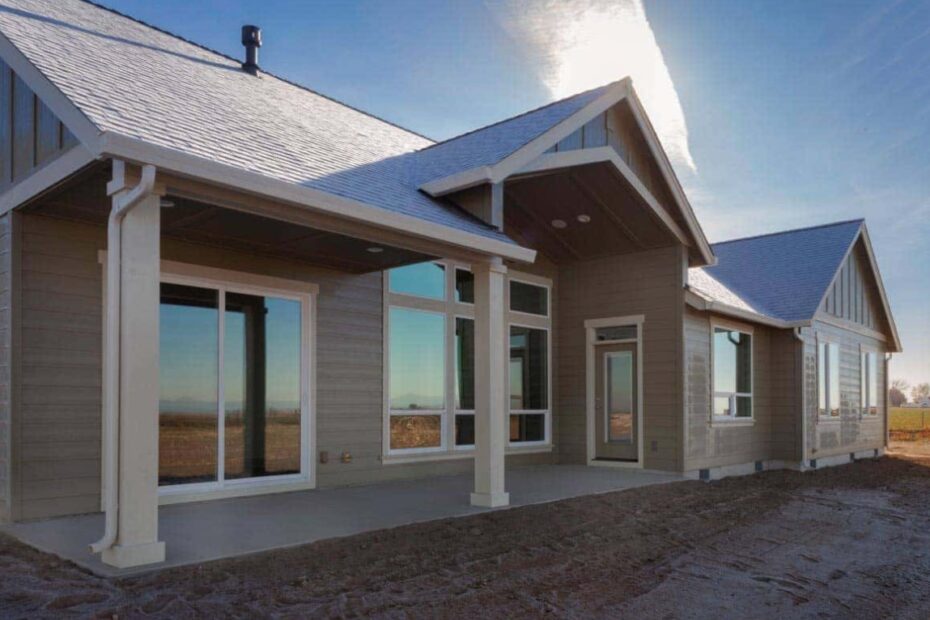This article aims to provide information on How To Get A Land Loan In Oregon? Securing a land loan in Oregon opens the door to building your dream home in the Beaver State. With its vast landscapes and burgeoning housing market, Oregon presents a unique opportunity for prospective homeowners. Understanding the nuances of land loans in Oregon is crucial for a strategic investment in your future property.
Key Takeaways
- Land loans in Oregon offer a pathway to homeownership, especially in areas where traditional homes may be out of reach.
- Lot loans allow you to build at your own pace, without the immediate pressure of construction.
- Lower insurance requirements mean more affordable monthly payments compared to traditional home loans.
- Equity built on land can aid in securing construction loans for future building projects.
How To Get A Land Loan In Oregon?
Getting a land loan in Oregon involves several detailed steps. Here’s a comprehensive guide to help you navigate the process:
1. Assess Your Needs and Eligibility
- Determine the Type of Land: Decide if you’re buying raw land, unimproved land, or a lot that’s ready for construction.
- Check Your Credit Score: A good credit score can increase your chances of loan approval and better interest rates.
- Evaluate Your Financial Health: Ensure your debt-to-income ratio is low and you have enough savings for a down payment, which can be between 20-50% of the land’s cost.

2. Research and Choose the Right Lender
- Compare Lenders: Look at various financial institutions, including banks, credit unions, and private lenders.
- Understand Lender Requirements: Each lender will have different requirements for credit scores, down payments, and other qualifying criteria.
- Select a Lender: Choose a lender that offers favorable terms and understands your specific land loan needs.
3. Understand the Land and Its Potential
- Zoning Laws: Research local zoning laws to ensure the land can be used for your intended purpose.
- Future Development Plans: Investigate any future development plans in the area that could affect the land’s value.
- Environmental Restrictions: Be aware of any environmental restrictions that could limit building or usage of the land.
4. Prepare and Submit Your Loan Application
- Gather Necessary Documents: This typically includes tax returns, bank statements, pay stubs, and a detailed plan for the land use.
- Complete the Loan Application: Fill out the lender’s application form thoroughly and accurately.
- Submit the Application: Provide the application and all supporting documents to your chosen lender.
5. Appraisal and Land Valuation
- Get an Appraisal: The lender may require a professional appraisal to determine the land’s value.
- Review Tax Assessor’s Valuation: Alternatively, some lenders may accept the valuation from the county tax assessor.
6. Loan Processing and Underwriting
- Loan Processing: The lender will process your application, which includes verifying your financial information and reviewing the land’s details.
- Underwriting: The underwriter will assess the risk of lending to you and may request additional information.
7. Loan Approval and Closing
- Receive Approval: If the lender is satisfied with all the information, they will approve the loan.
- Review the Loan Terms: Before signing, carefully review the loan terms, including the interest rate, repayment schedule, and any penalties.
- Close the Loan: Sign the loan documents, typically at a title company or attorney’s office. Pay any required closing costs.
8. Post-Loan Considerations
- Land Development: Begin any development or improvements on the land as planned.
- Loan Payments: Make regular payments on your land loan according to the agreed terms.
- Monitor Land Value: Keep an eye on the land’s value and any changes in the local real estate market.
9. Future Building or Selling
- Construction: If you plan to build, you may need to secure a construction loan once you’re ready to start.
- Selling the Land: If you decide to sell the land, the equity you’ve built can help in the sale or in securing another loan.
Each step requires careful consideration and thorough preparation. It’s advisable to consult with a financial advisor or a real estate attorney to ensure that you understand all the legal and financial implications of getting a land loan in Oregon.
Understanding Land Loans in Oregon
Land loans in Oregon are designed to finance the purchase of your own slice of paradise. Unlike farm or construction loans, land loans offer flexibility, allowing you to build when you’re ready. Lenders offer various terms, often without acreage limits, making it possible to finance large plots of land.

The Process of Acquiring a Land Loan
Applying for a land loan is similar to obtaining a mortgage. However, lenders face more risk, as land valuations can be complex and there’s no immediate property collateral. If you plan to build eventually, this can make your loan application more attractive.
Top Lenders for Oregon Land Loans
Several institutions stand out for land loans in Oregon:
- Banner Bank: Offers fixed or adjustable rates, financing up to 75% of lot value.
- Oregon State Credit Union: Provides financing for up to 80% of land value with a 15-year term.
- Gregory M. Russell: A hard money lender with flexible credit and income requirements.
- AgAmerica Lending: Specializes in agricultural land loans with terms up to 30 years.
- WaFd Bank: Offers land loans with terms up to 20 years, even if construction isn’t imminent.
Is a Land Loan Right for You?
Consider a land loan if you’re looking to build in the near future or if you’re priced out of existing homes in your desired area. These loans are ideal if you’re open to a higher interest rate and the concept of building a custom home or vacation property.

Financing Your Oregon Dream
Land loans in Oregon are a strategic choice for those looking to invest in their future home. With the right lender and terms, you can secure a piece of Oregon’s diverse landscape, from city outskirts to rural expanses.
Building on Your Investment
Once you’ve secured your land, the next step is to build equity. This equity is key to qualifying for construction loans, which will bring your dream home to fruition. With Oregon’s land value averaging around $6,502.58 per acre, investing in land now can be a wise financial decision.
Evaluating Land Loan Types
When considering a land loan in Oregon, it’s essential to understand the different types available. Raw land loans are for undeveloped land without any services or utilities in place. These can be more challenging to acquire due to the higher risk involved.

On the other hand, improved land loans are for land that has some development, such as access to utilities and roads. Lenders are more likely to offer favorable terms for improved land due to the lower risk.
Securing a loan for raw land in Oregon requires thorough preparation. Lenders will want to see a solid plan for the land’s use, a substantial down payment, and possibly a higher credit score. It’s crucial to have a clear vision and perhaps even preliminary designs for the property to demonstrate its potential to lenders.
Improved Land Loans: A Smoother Path
For those eyeing improved land, the process can be smoother. Lenders may offer better interest rates and terms. It’s important to compare different lenders to find the best deal. Always consider the long-term implications of the loan terms, not just the initial rates.
Strategic Planning for Land Purchase
A strategic approach to purchasing land in Oregon involves more than just securing a loan. It’s about understanding zoning laws, future area development plans, and the land’s potential for appreciation. Before committing to a land purchase, consider the resale value and any environmental restrictions that may impact your use of the land.
Zoning Laws and Long-Term Planning
Zoning laws in Oregon can significantly affect what you can do with your land. Researching these laws is crucial before purchasing. Consider how the area might grow in the next decade. Is the land likely to increase in value due to upcoming developments? These factors can influence both the utility and the financial viability of your investment.
Environmental Considerations and Resale Value
Oregon’s diverse environment, from coastal regions to forested areas, means environmental considerations are key. Wetlands, endangered species, and other ecological factors can restrict building options. Additionally, think about the land’s resale value.
Even if you plan to build, circumstances can change, and you might decide to sell. Ensuring the land has potential appeal to future buyers is an essential part of your investment strategy.
Financing Options and Interest Rates
Financing a land purchase in Oregon can vary greatly depending on the lender and the type of land being purchased. Traditional banks, credit unions, and private lenders all offer land loans, but their terms can differ. Interest rates for land loans are typically higher than for a standard mortgage, reflecting the higher risk associated with land purchases.

Traditional Banks vs. Credit Unions
Traditional banks may offer more competitive interest rates but often have stricter requirements. Credit unions, being not-for-profit institutions, might provide more personalized service and potentially better rates for members. It’s worth exploring both avenues to see which offers the best terms for your specific situation.
Private Lenders: An Alternative Route
Private lenders can be a viable alternative, especially for those who may not meet the stringent requirements of traditional financial institutions. They may offer more flexible terms and faster closing times. However, be prepared for potentially higher interest rates and ensure you understand all the terms before proceeding.
Preparing for the Land Loan Application
A successful land loan application in Oregon hinges on preparation. Lenders will look at your credit score, debt-to-income ratio, and your plans for the land. Having a detailed plan for the property, including timelines for development and construction, can strengthen your application.
Creditworthiness and Down Payment
Your credit score is a critical factor in securing a land loan. A higher score can lead to better loan terms. Additionally, lenders typically require a larger down payment for land loans — sometimes as much as 20-50%. Saving for a substantial down payment can demonstrate your commitment and financial stability to a lender.
Detailed Plans and Development Timelines
Lenders will want to see a comprehensive plan for the land’s use. This includes timelines for when you plan to start and complete construction. Providing detailed plans can show lenders that you are serious and have thought through the investment, increasing your chances of loan approval.
Can You Get A Loan For Land In Oregon?
Yes, obtaining a loan for land in Oregon is feasible and accessible. Oregon State Credit Union, for instance, offers land loans to both members and non-members residing or working in Oregon.

These loans are designed for the eventual construction of an owner-occupied residence, with no requirement to build within a set timeframe, providing flexibility to plan and build your dream home.
The types of properties financed include building lots within city limits with immediate access to public utilities, as well as bare land of 1-10 acres with basic improvements and utilities.
Features of such a land loan typically include financing up to 80% of the land’s value, a 15-year term, local decision-making, a fixed interest rate, and a minimum down payment of 20%. There’s also no pre-payment penalty for early payoff, which is an added advantage for borrowers.
Which Loan Is Best For Buying Land?
The best loan for buying land will depend on your specific needs, financial situation, and the property’s characteristics. However, a fixed-rate loan with a term of 15 years, like the one offered by Oregon State Credit Union, is often recommended for its stability and predictability.

It allows you to finance up to 80% of the land’s value, which can be beneficial if you don’t have the cash on hand to cover the full cost of the land. The fixed interest rate ensures that your monthly payments remain consistent throughout the term of the loan, which can help with long-term financial planning.
Additionally, the absence of a pre-payment penalty is advantageous if you decide to pay off the loan early. When choosing a loan, it’s crucial to consider the interest rates, loan terms, and the lender’s expertise in land loans to ensure that you select the best option for your land purchase.
What Is Purchase Loan?
A purchase loan, often referred to as a purchase-money mortgage, is a financial arrangement where the property seller extends a loan to the buyer, facilitating the purchase without the need for traditional bank financing.

This type of loan is particularly beneficial for buyers who may not qualify for standard bank loans due to credit issues or other financial constraints. The seller, acting as the lender, sets the terms of the loan, including the down payment, interest rate, and closing fees.
The agreement is formalized through a financing instrument, which is recorded with the county to protect both parties’ interests.
The primary allure of a purchase-money mortgage is its accessibility to those with less-than-ideal credit scores or high debt-to-income ratios. It offers a quicker closing process and potentially lower closing costs compared to traditional loans.
However, it also carries risks such as higher interest rates, the possibility of foreclosure, and balloon payments. Buyers should weigh these factors carefully and consider strengthening their financial standing for traditional financing options.
Can You Finance Land In WA?
To address the question of financing land in Washington (WA), it’s important to understand that land loans are available and can be tailored to the buyer’s needs. However, the specifics of land financing can vary significantly based on the lender’s policies, the type of land being purchased, and the intended use of the land.

Buyers typically have options such as a raw land loan, an improved land loan, or a construction-to-permanent loan, each with its own set of qualifications and terms.
Financing land in WA, like in any other state, requires thorough research and comparison of lenders to find the best terms and rates. It’s also crucial for buyers to have a clear plan for the land, as this can affect loan approval and conditions.
Buyers should consult with local financial institutions, credit unions, and specialized land loan lenders to explore their options and find the most suitable financing solution for their land purchase in Washington.
Conclusion
In Oregon, a land loan can be the first step toward creating your ideal living space. With options for financing both improved and unimproved land, these loans offer a flexible route to homeownership. As you consider a land loan, think about your long-term goals and how a piece of Oregon’s land can become the foundation for your dream home.
Top FAQ’s
What is the maximum loan-to-value ratio for land loans in Oregon?
In Oregon, you can typically loan up to 50% of the value of your property. If your property is valued at $100,000 and you owe $25,000, you could potentially loan an additional $25,000, totaling 50% of the property’s value.
How is the value of my property determined for a land loan?
The market value as indicated by your local county Tax Assessor is commonly used. This method is quick and free, avoiding the need for a costly and time-consuming appraisal. However, if you believe your property’s value is higher, you can opt for an appraisal at your own expense.
What types of properties are eligible for land loans in Oregon?
Eligible properties for land loans include houses, mobile homes with land, rental properties, lots, farms, acreage, timberland, commercial, and industrial properties. Loans on contracts and partial interests are also possible.
Can I get a land loan in Oregon if my credit is poor?
Yes, your credit score is not as crucial for land loans in Oregon. Many lenders understand that there can be valid reasons for credit issues and may still provide financing options.
How do I start the process of getting a land loan in Oregon?
You can begin by calling a loan officer or filling out an online application form provided by the lender.
A multifaceted professional, Muhammad Daim seamlessly blends his expertise as an accountant at a local agency with his prowess in digital marketing. With a keen eye for financial details and a modern approach to online strategies, Daim offers invaluable financial advice rooted in years of experience. His unique combination of skills positions him at the intersection of traditional finance and the evolving digital landscape, making him a sought-after expert in both domains. Whether it’s navigating the intricacies of financial statements or crafting impactful digital marketing campaigns, Daim’s holistic approach ensures that his clients receive comprehensive solutions tailored to their needs.









